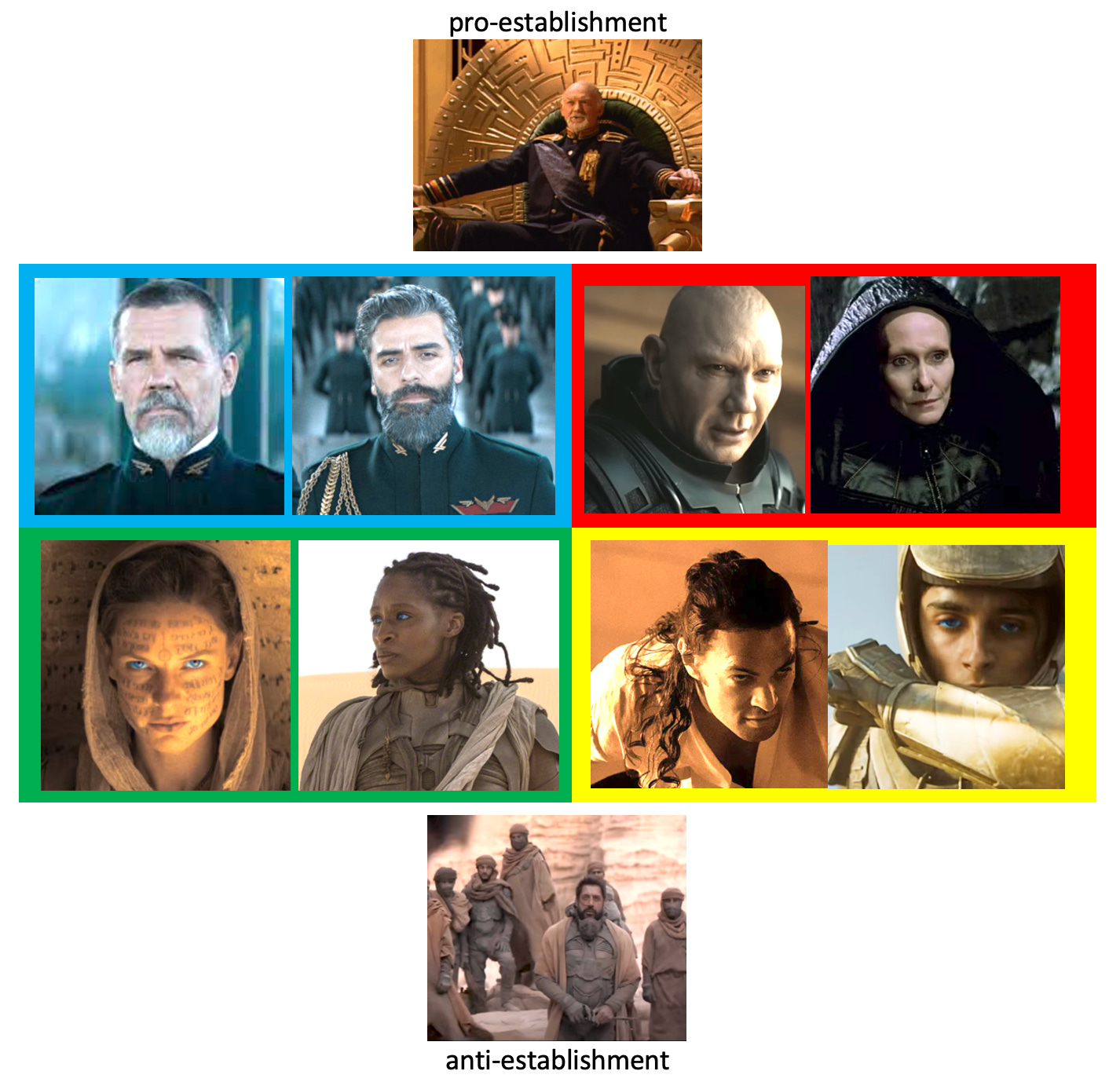In the 2021 version of the movie Dune, there was a striking discussion about willingness to support the emperor, even knowing that he was ruling unethically, because without the presence of that dominant power, there would be chaos.
A writer covering movies and pop culture notes, “the name of the Fremen, an idealized warrior society unbound by the strictures of civilization, was probably slightly obvious even in 1965.” Their code of conduct is about survival, which supersedes compassion. In addition to good versus evil, clearly a main theme is the establishment versus the anti-establishment. This may seem a trivial post, but creating avatars for the Pew types is a helpful way of understanding the core values.
Republicans, this won’t be a flattering description for you, because like Star Wars and many narratives about political struggle, the powerful authoritarian forces are the oppressive enemy. For more even handed treatment, please look back to Each Quadrant Has a Hero and a Shadow, The Blame Game, or Optimism vs Futility.
The Establishment
The red quadrant, along with the pro-business pro-war Harkonnan leader, contains the religious establishment, in this case the leader of the Bene Gesserit (bene = well or right in its Latin roots + a similar sound to Jesuit). As has historically been the case, the religious establishment contains strong political players, ceremonially sanctioning the emperor’s will.
While the Harkonnan are all about profit, demanding obedience out of fear, Duke Atreides (blue quadrant) inspires loyalty by putting people over profit. Still, the Duke is a law-and-order advocate, obeying the emperor even with strong suspicions that the emperor intends to undermine him. His close companion and chief officer Halleck suggests to the Duke’s son Paul that there is no merit to superstitions and dreams, exemplifying the establishment left’s rational bent. The democratic mainstay is represented by the soldiers behind.
The Anti-establishment
The Duke’s loyal sword master and pilot Duncan Idaho (see “Party Stronghold States”) also allies with the tribal Fremen without giving up his establishment ties. Ecologist Liet-Kynes must pretend to have no loyalties other than to the emperor, to maintain her position, but she assists the planet’s newcomers in escaping the Harkonnan attack. Liet-Kynes eventually admits she is loyal most fundamentally to the cause of terraforming the planet, and she is Fremen, part of the resistance.
Lady Jessica and Paul both have special status as main characters with tension as to which causes they will ultimately ally with, or act as coalition-builders between. If pressed, I would place Jessica in Pew’s outsider left, and Paul in the ambivalent right, the latter showing individualist impulse in willingness to abandon the community of his youth. Both mother and son exemplify the green quadrant’s “spiritual but not religious” nature, by accepting and using spiritual gifts/powers, while at times defying the mandates of the religious establishment. Paul maintains ties with and guidance from the establishment left, but he intuits that his future is with the Fremen, rejecting his mother’s wish to return to their home planet and familiar culture.
The Sequel
The movie must leave out notable plot twists, for brevity. After watching Dune 2021, you might find the following link helpful. It contains a spoiler or two but could make the original and sequel more interesting and comprehensible. There will still be plenty of surprises.
Dune: 10 Things Only Book Readers Know About Lady Jessica.
There is hope in the Duniverse. The populist right may resist the urge to burn it all down, just so they can see the sequel.
Thanks for reading! You can find dissenting interpretations in the Reddit channels devoted to political compass memes. Alternatively, see the related post U.S. Culture Wars Compared to Family Member Gripes as a related post.




